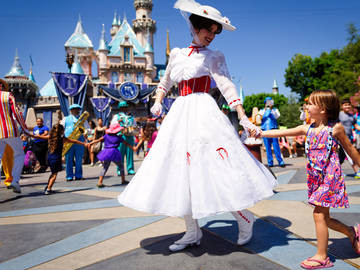For many, the word supercalifragilisticexpialidocious is instantly associated with the magical 1964 film Mary Poppins. This movie undeniably catapulted the word into popular culture, embedding it in our collective memory. The song, and the word itself, became a whimsical highlight of the beloved Disney classic. But where did this extraordinary word truly come from, and what are the real supercalifragilisticexpialidocious song words origins?
 A girl offers to spell 'Supercalifragilistic' for Mary Poppins in the iconic movie scene
A girl offers to spell 'Supercalifragilistic' for Mary Poppins in the iconic movie scene
The songwriting duo behind the catchy tune, brothers Richard and Robert Sherman, provided insight into the word’s playful genesis. They explained that supercalifragilisticexpialidocious was born from the same imaginative process many children use – creating grand, nonsensical words for fun.
We reminisced about making up big double-talk words as kids,” they recounted. “We wanted to create a humorously large, silly word for the children in the movie, and that’s where it began. ‘Obnoxious’ felt too harsh, so we considered ‘atrocious,’ which has a British flair. From ‘atrocious’, we moved to ‘precocious’ to suggest intelligence. We combined ‘super’ with a double-talk sound to arrive at ‘califragilistic,’ which essentially means nothing – it simply emerged that way during our playful word creation.
Interestingly, the Sherman brothers weren’t the first to conceive of a word resembling supercalifragilisticexpialidocious. A 1949 song titled Supercalafajalistickespeealadojus predated the Mary Poppins hit. This led to a copyright infringement lawsuit against the Sherman brothers. However, the court ultimately ruled in their favor. Evidence surfaced demonstrating that variations of the word existed long before 1949, undermining the plaintiff’s claim of originality.
Delving further back in time, the earliest documented instance of a similar word appears in a 1931 “A-muse-ings” column by Helen Herman in The Syracuse Daily Orange, Syracuse University’s student newspaper. Herman coined supercaliflawjalisticexpialidoshus, describing it as a word encompassing “all words in the category of something wonderful.” She elaborated on its efficiency, noting, “though rather long and tiring before one reaches its conclusion, … once you arrive at the end, you have said in one word what it would ordinarily take four paragraphs to explain.”
In Mary Poppins, the supercalifragilisticexpialidocious song words are presented as “something to say when you have nothing to say.” Yet, this seemingly nonsensical string of syllables has undeniably brought joy and cheer to audiences for decades. Much like Helen Herman intended with her original creation, the word has become a popular expression for something exceptionally good or wonderful.
He crammed a generous chunk of the mix in his mouth and blew a bubble. The bubble rose, rose higher. It was a big beautiful bubble, … a supercalifragilisticexpialidocious bubble. — Robert Hendrickson, Smithsonian, July 1990
Beyond the full word, shortened forms like the adjective supercalifragilistic and the adverb supercalifragilistically have also emerged. While less common, these variations carry the essence of the original, signifying something amazing or wonderful.
If Trump is going to start trade wars and raise tariffs, he should explain how his supercalifragilistic deals will both punish these countries and make goods cheaper for American consumers. — David Harsanyi, Times Record News (Wichita Falls, Texas), 12 Mar. 2016
For a real good time, just tell your parents to take you to any one of the supercalifragilistically spectacular places listed below. — Key, 7 Feb. 1987
Finally, addressing the playful assertion in Mary Poppins that uttering the word loudly makes one sound precocious, concrete evidence remains elusive. Regardless of its impact on perceived precociousness, supercalifragilisticexpialidocious song words continue to enchant and amuse, solidifying their place as a unique and joyful contribution to the English language, far beyond the realms of Cherry Tree Lane.
